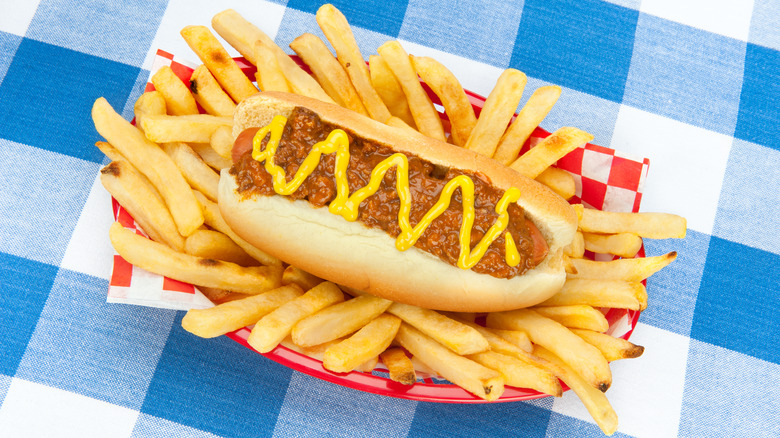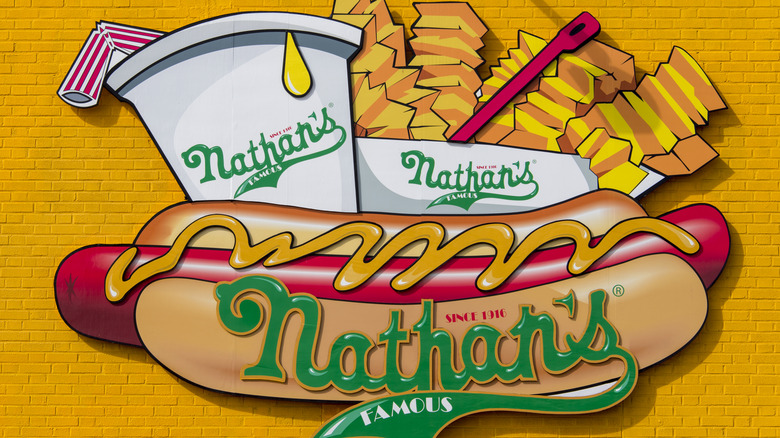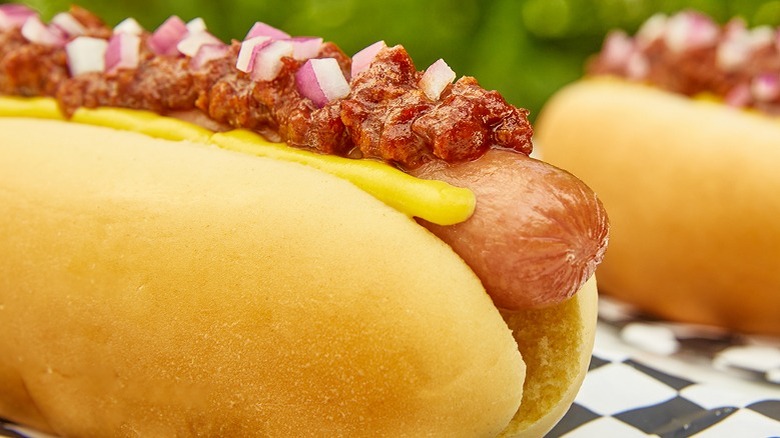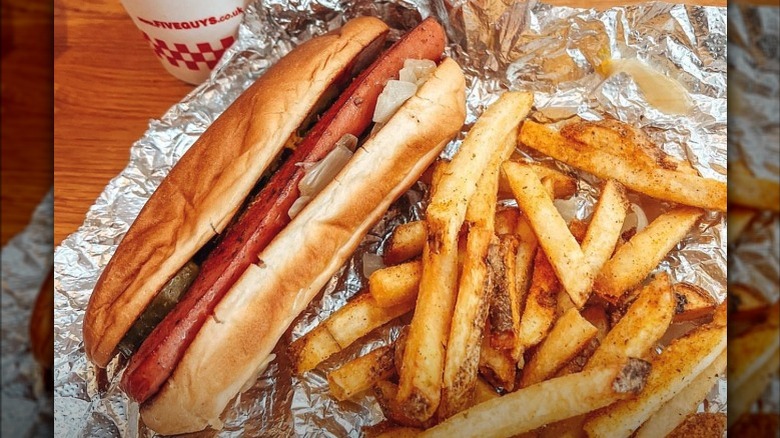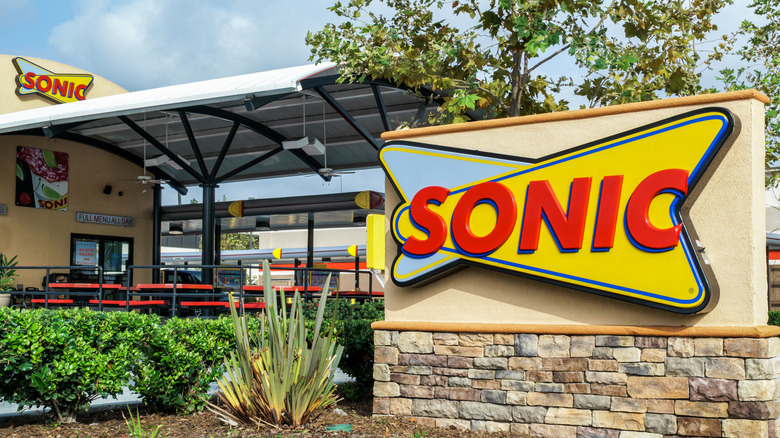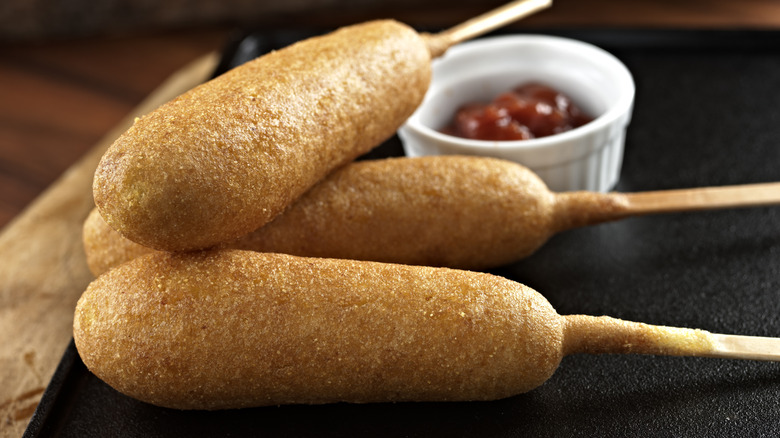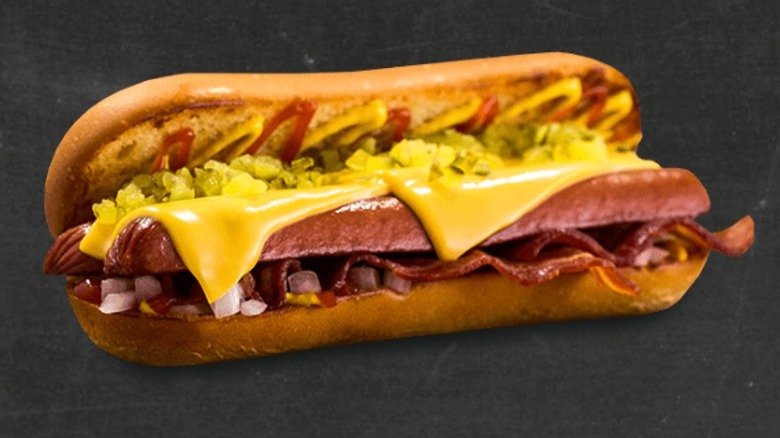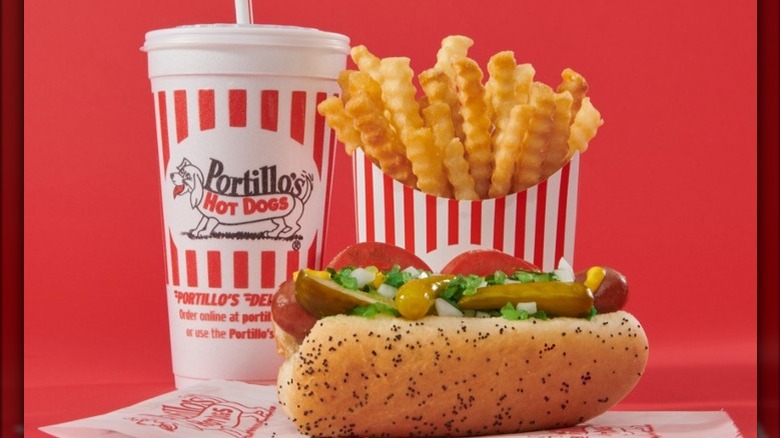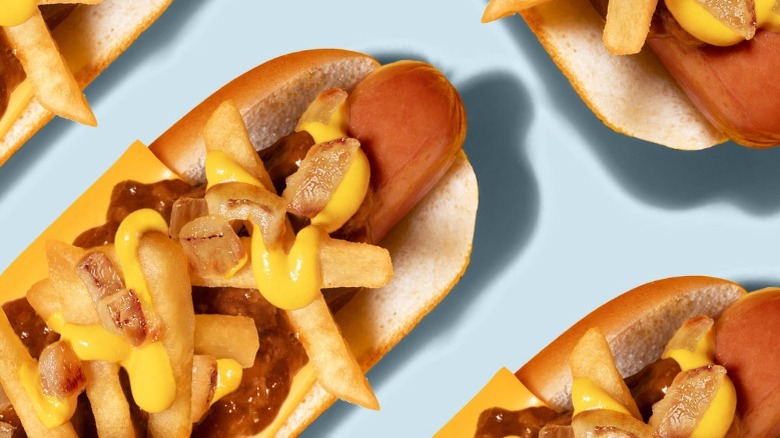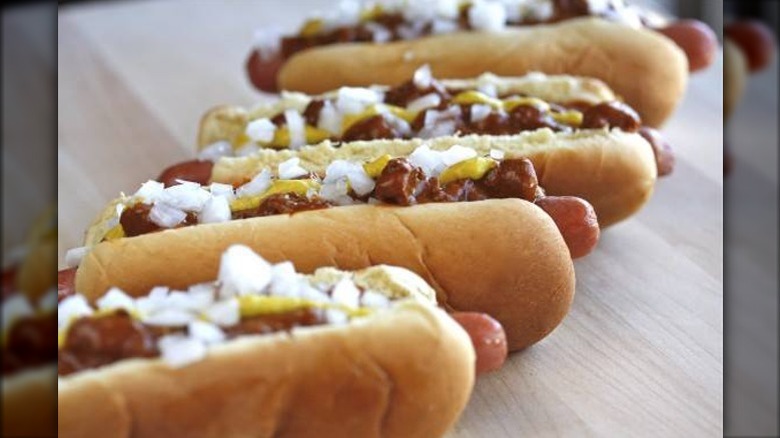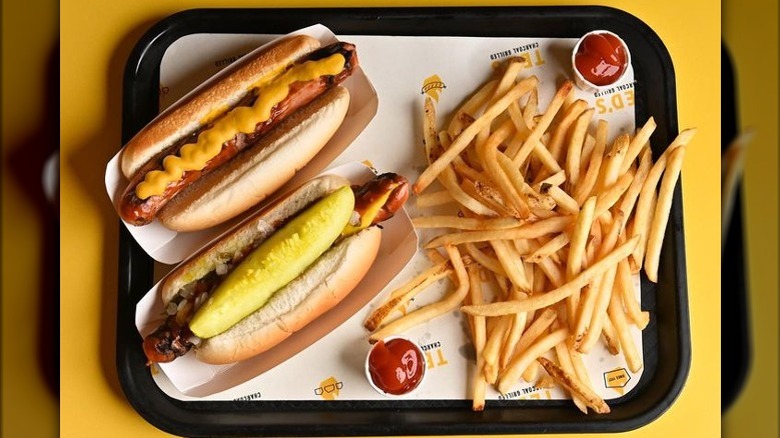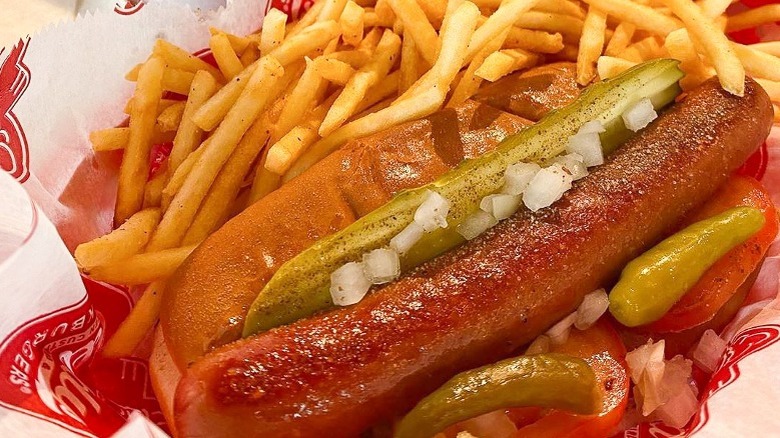Fast Food Restaurants That Serve All-Beef Hot Dogs
Popular wisdom maintains that no one wants to know what goes into making a sausage. But sometimes, people really need to know before taking a bite. Pork is a common meat put into sausages like bratwurst and hot dogs. But millions of people cannot or choose not to eat pork, whether due to a food allergy, religious reasons, or some other rationale. For these folks, knowing which dogs use pork in their products is essential.
Many regional hot dogs call for all-beef ingredients, such as New York and Chicago-style dogs. So it is unsurprising that the companies that make hot dogs and grew big enough to spread their product across the United States, also use all-beef hot dogs. For example, Chicago gave birth to Vienna Beef, the traditional local brand for assembling a Chicago-style hot dog. And to sticklers of tradition, the right kind of meat is vital for authenticity and flavor.
Some of these brands have grown into their own fast food hot dog chains. Others are now used by fast food chains. Some even enjoy both statuses, having made their signature sausages available commercially. If you are one of those people to whom an all-beef hot dog is an absolute must, read on to find fast food chains that serve an all-beef hot dog that you can be confident eating.
Nathan's Famous
The founder and namesake of Nathan's Famous, Nathan Handwerker, began selling hot dogs made with his wife's special recipe in 1916. Over the previous century, what started as a single hot dog stand in New York City's Coney Island has grown into an international chain of franchise restaurants. You can also buy packages of Nathan's Famous hot dogs in supermarkets.
In the early days, Handwerker sold his hot dogs for only five cents, half the price of his closest competition. It was not uncommon to mix meats to create a cheaper sausage, including pork or horse meat, but Handwerker's hot dogs were 100 percent beef. Because he wanted to reassure his Jewish customers of the purity of his hot dogs, he coined the term "kosher-style." He could not market the hot dogs as kosher without proper rabbinic supervision.
Nathan's Famous continues this tradition today. Those who keep kosher should avoid them, but for those who are only concerned about the meat, Nathan's Famous hot dogs remain all beef. Bonus, they are also gluten free and made in a gluten-free facility, making them safe for those who cannot eat gluten (if they stay away from conventional hot dog buns, of course). Removing gluten is the only alteration to the original hot dog recipe in the long history of the brand.
Shake Shack
Another hot dog stand that has grown well beyond its humble beginnings is Shake Shack. It began as a way to support the renovation and revitalization of New York City's Madison Square Park as spearheaded by successful restaurateur Danny Meyer. In no time, news of the hot dog cart spread far and wide, and it remained in the park for about three years. Then, in 2004, Shake Shack won the bid to open as a kiosk-style restaurant in that same park. And the rest, as they say, is history.
The original hot dog cart used the kitchen of the nearby fine dining restaurant Eleven Madison Park, which Meyer owned at the time. Now in its own kitchens, Shake Shack sources its all-beef hot dogs from Chicago's illustrious Vienna Beef. The sausages are split down the middle, then grilled and served up on buttered and grilled potato buns. And, in our opinion, no one should pass up handing over the extra dollar for a topping of cheese sauce.
Like Nathan's Famous, Vienna Beef hot dogs are not kosher. To achieve that signature snap, Vienna Beef uses natural sausage casings, which may or may not come from a cow. (Pigs, sheep, and goats are commonly used to make natural casings.) But rest assured, the inside is 100% juicy, delicious beef.
Checkers and Rally's
If you aren't familiar with Checkers or Rally's, you might think we're talking about two different restaurants. And they did indeed start out that way. Checkers was founded in Alabama in 1986. Rally's opened its door — or rather service windows — two years prior in Tennessee. The two merged in 1999, and, similar to Hardee's and Carl's Jr., the name the restaurant goes under largely depends on which part of the U.S. you find yourself in.
Both Checkers and Rally's locations serve grilled all-beef hot dogs on toasted buns with ketchup and mustard. Like Shake Shack, you can add cheese sauce for a small fee. But it isn't the hot dogs themselves, or their contents, that put this chain into the news in 2016.
For a brief period beginning in early 2016, the much larger fast food chain Burger King tried selling its own hot dogs. Checkers and Rally's was not about to take this encroachment into its territory sitting down. It took out a full-page ad in USA Today that addressed Burger King directly, daring the fast food giant to "compare wieners" and accusing it of "overcompensating."
Burger King's hot dogs did not last long. Checkers and Rally's, however, triumphantly continue serving up beef hot dogs on the regular, as it's done for nearly 40 years.
Five Guys
In 1986, the first Five Guys opened its doors in Arlington, Virginia. There are now around 1,500 Five Guys locations spread across the U.S. While its burgers may be one of the main attractions, the hot dog choices are nothing to laugh at and are given just as many options. There is the regular hot dog, cheese dog, bacon dog, and bacon cheese dog. But being Five Guys, the topping options go well beyond just cheese and bacon. You can basically design the hot dog of your dreams.
As for the sausages themselves, they are not only 100 percent beef but also kosher. (Though there isn't a dedicated kosher kitchen, so buyer beware.) Five Guys sources its hot dogs from Hebrew National, which the meat company claims are made from all kosher beef as well as being gluten free.
Like Nathan's Famous, Hebrew National was launched in New York City at the beginning of the 20th century. Founder Theodore Krainin quickly earned a reputation for producing sausages of a higher quality than the law required. As the now famous slogan states, Hebrew National answers to a higher authority. While there has been some debate over how closely the manufacturer sticks to proper kashrut practices when making its hot dogs, you can at least be sure that the meat is pure beef.
Sonic Drive-in
Even if you don't live near a Sonic, chances are you are still aware of this popular drive-in chain due to its widespread advertising campaigns. Unsurprisingly given its business model, Sonic began its days as a root beer stand in the middle of the 20th century when this style of restaurant was at its peak popularity. These were the days before cola became the carbonated beverage of choice across America and an iced cold root beer paired perfectly with a hot dog and fries.
Sonic has a pretty varied menu that offers burgers, sandwiches, as well as hot dogs. You can choose between All-American dogs, chili cheese coney dogs, corn dogs, and, if you are really hungry, footlong quarter-pound coney dogs. Each regular-sized dog is made from 100 percent pure premium beef. The footlong hot dog, on the other hand, is a blend of pork and beef. So if you need to satisfy a big hunger and want premium beef, you're better off ordering two or three regular-sized coney dogs.
Hot Dog on a Stick
Born on the sunny beaches of Santa Monica, California, in 1946, Hot Dog on a Stick is a fast food chain with a very straightforward business model. This now international company, with locations as far away as the Philippines and South Korea, sells hot dogs on sticks (what it calls corn dogs) as well as cheese on sticks, funnel cake sticks, French fries, and a variety of lemonades, which are about the only thing the chain sells that don't come in stick form. The hot dog protein choices are turkey, veggie, and, most important to us here, beef. The breading, or what it calls Party Batter, comes from founder Dave Barham's mother's top-secret cornbread recipe.
Remember when we said some of these hot dog restaurants also make their sausages commercially available? Hot Dog on a Stick's 100% all-beef hot dogs are actually Nathan's Famous kosher-style hot dogs. So you can enjoy all of the assurances of Nathan's Famous in your Hot Dog on a Stick corn dog. Note that while Nathan's Famous hot dogs are gluten free, Hot Dog on a Stick's Party Batter definitely is not.
Mooyah
Launched in Plano, Texas, in 2007, Mooyah is another burger, fries, and shake international fast food restaurant chain that also serves hot dogs. With a growing presence across the U.S., Mooyah locations can also be found around the Vancouver, Canada metro area, as well as in Oman, Qatar, and Bahrain.
As the name implies, Mooyah is pretty serious about its beef. For its burgers, it uses Certified Angus Beef, and for the hot dogs, it's Hebrew National, the same brand used by Five Guys. The hot dogs are split before being grilled and tucked into a toasted potato bun. There are an incredible 26 choices of toppings and sauces, which offer nearly infinite combinations.
There are, however, two signature dogs that are worth consideration. The Full Count comprises of a Hebrew National all-beef hot dog, bacon, American cheese, onions, relish, ketchup, and mustard. Or you can spice things up with the Diablo Dog, an all-beef hot dog topped with pepper jack cheese, bacon, jalapeños, Cholula brand hot sauce, and mayonnaise. Hebrew National hot dogs are certified gluten-free. Mooyah also offers a gluten-free bun option, so even those with gluten intolerance can go to town designing their own perfect dog.
Portillo's
Dick Portillo opened his first hot dog stand, dubbed The Dog House, in 1963 in Villa Park, Illinois, a part of the Chicago metropolitan area. Since then, Dick Portillo has been named the Hot Dog King of Chicago, and Portillo's has expanded well beyond Chicagoland with locations as far away as California, Arizona, and Florida. Although it now serves burgers and other sandwiches, hot dogs are still listed first on the menu.
Even in The Dog House days, Portillo's cooked 100% beef hot dogs supplied by Chicago's favorite Vienna Beef. Due to this long-standing relationship between the two businesses, Dick Portillo was awarded Vienna Beef's very first Legends Award, which inducted him into the Vienna Beef Hot Dog Hall of Fame. In fact, Portillo's is so into real beef that its phone number is 866-YUM-BEEF.
Being so proud of its Chicago heritage, it is only natural that the simply named "hot dog" on the menu comes Chicago style with mustard, relish, chopped onions, sliced tomatoes, a kosher pickle, sport peppers, and celery salt all on a steamed poppy seed bun. You could order a chili cheese dog, which also comes on a poppy seed bun, but considering that 53% of Portillo's customers order their dogs Chicago style, we think this is one Chicago dog that is not to be missed.
Wienerschnitzel
Wiener schnitzel is a type of fried veal cutlet, but you will not find it anywhere on the menu of the fast food restaurant chain Wienerschnitzel. Founder John Galardi opened the first Wienerschnitzel in Southern California in 1961. The chain now boasts that it is the world's largest hot dog chain and sells the world's most wanted wiener. Other items like burgers, sandwiches, and breakfast burritos are on the menu, but clearly, the hot dogs take center stage.
Wienerschitzel hot dogs come in two varieties of dog, the world-famous original, all beef, and Polish. It's difficult to tell what makes up the Polish dog, though we suspect it's kielbasa, Poland's favorite sausage, which usually contains pork. So if you want to be sure you're getting 100% beef, stick with the original. (You can also order a veggie dog, so the menu is not all meat.)
There are 11 hot dogs on the menu to choose from, and that's not counting the honey batter-dipped corn dogs or mini corn dogs. And in addition to a meat (and non-meat) option, you can choose between a regular hot dog bun, which we're sure tastes just fine, or a pretzel bun, which is a twist on the traditional hot dog that we didn't know we needed in our lives until now.
A&W
We hope it doesn't come as a surprise that A&W is more than a best-selling root beer. A&W got its start in Lodi, a small town in Northern California, in 1919. The name A&W comes from founders Roy Allen, whose root beer recipe was used, and Frank Wright. The pair expanded their business by opening root beer stands first across California, then the entire United States. This growth was undoubtedly aided by the implementation of Prohibition, which lasted from 1920 to 1933.
Despite an A&W franchise owner, Dale Mulder, inventing the bacon cheeseburger in 1963, A&W drive-ins also specialize in hot dogs. Choose between a regular hot dog, coney dog, or coney cheese dog. There are also corn dog nuggets.
A&W's website advertises that its dogs are made from 100% beef, but it comes with a caveat. All-beef hot dogs are available at "participating locations only." Owned by a consortium of franchisees, each location may source its own products. If you want to be sure your location serves the all-beef variety of dogs, you will have to ask before ordering.
Ted's Hot Dogs
Founded nearly a century ago in 1927, Ted's Hot Dogs is a modest chain of fast food restaurants in New York State and Arizona serving all kinds of grilled food. Ted's uses genuine hardwood charcoal and a cast iron grill to dish up chicken, hamburgers, and hot dogs. Theodore Spiro Liaros started with a horse-drawn hot dog cart in Buffalo, New York. Perhaps this is why Ted's sources its all-beef hot dogs from Buffalo-based meat packing company Sahlen's, a family-owned business since 1869.
Ted's offers some unexpected toppings. Ever craved a hot dog piled high with caramelized onions, macaroni and cheese, and sauerkraut? What about chili and onion rings? Cheese sauce with peppers and onions? Ted's is the place for you. You can also choose between two different types of bacon, sliced or diced. There are also six varieties of dipping sauces to drizzle over your dog. Dunking is also acceptable.
Freddy's Frozen Custard and Steakburgers
Freddy's Frozen Custard and Steakburgers wasn't founded by a World War II veteran, but it was named after one. Founded by Bill Simon, Randy Simon, and Scott Redler, Freddy's was named after Bill and Randy's father, who later became the face of the restaurant. In addition to honoring their dad, who had earned a Purple Heart during his service, the trio liked how "Freddy" sounded next to "frozen." Redler and the Simon brothers were already successful in the restaurant business as franchise owners and vice presidents, so Freddy's was more a labor of love than a vital income source.
Although it is perhaps better known for its steak burgers, shoestring French fries, and frozen custard, Freddy's also serves 100% beef hot dogs on a toasted split-top bun. Like others on this list, Freddy's uses Vienna Beef hot dogs, so customers know what they are getting. And yes, Freddy's does offer dogs Chicago style.
